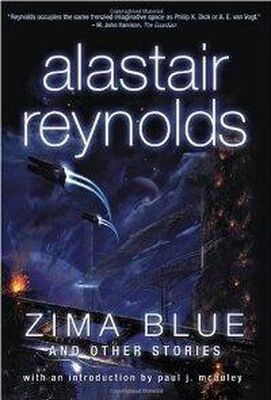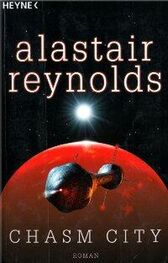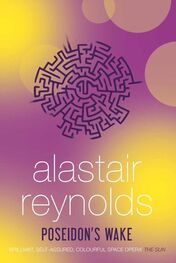Another robot lived in his swimming pool.
It toiled endlessly up and down and along the ceramic sides of the pool, scrubbing them clean. The young man could have bought a cheap swimming pool cleaner from a mail-order company, but it amused him to design the robot from scratch, according to his own eccentric design principles. He gave the robot a full-colour vision system and a brain large enough to process the visual data into a model of its surroundings. He allowed the robot to make its own decisions about the best strategy for cleaning the pool. He allowed it to choose when it cleaned and when it surfaced to recharge its batteries via the solar panels grouped on its back. He imbued it with a primitive notion of reward.
The little pool cleaner taught the young man a great deal about the fundamentals of robotics design. Those lessons were incorporated into the other household robots, until one of them —a simple household cleaner—became sufficiently robust and autonomous that the young man began to offer it as a kit, via mail-order. The kit sold well, and a year later the young man offered it as a pre-assembled domestic robot. The robot was a runaway success, and the young man’s firm soon became the market leader in domestic robots.
Within ten years, the world swarmed with his bright, eager machines.
He never forgot the little pool cleaner. Time and again he used it as a test-bed for new hardware, new software. By turns it became the cleverest of all his creations, and the only one that he refused to strip down and cannibalise.
When he died, the pool cleaner passed to his daughter. She continued the family tradition, adding cleverness to the little machine. When she died, she passed it to the young man’s grandson, who happened to live on Mars.
“This is the original pool,” Zima said. “If you hadn’t already guessed.”
“After all this time?” I asked.
“It’s very old. But ceramics endure. The hardest part was finding it in the first place. I had to dig through two metres of topsoil. It was in a place they used to call Silicon Valley.”
“These tiles are coloured Zima Blue,” I said.
“Zima Blue is the colour of the tiles,” he correctly gently. “It just happened to be the shade that the young man used for his swimming pool tiles.”
“Then some part of you remembered.”
“This was where I began. A crude little machine with barely enough intelligence to steer itself around a swimming pool. But it was my world. It was all I knew; all I needed to know.”
“And now?” I asked, already fearing the answer.
“Now I’m going home.”
I was there when he did it. By then the stands were full of people who had arrived to watch the performance, and the sky over the island was a mosaic of tight-packed hovering ships. The distortion screen had been turned off, and the viewing platforms on the ships thronged with hundreds of thousands of distant witnesses. They could see the swimming pool by then, its water mirror-flat and gin-clear. They could see Zima standing at the edge, with the solar patches on his back glinting like snake scales. None of the viewers had any idea of what was about to happen, or its significance. They were expecting something—the public unveiling of a work that would presumably trump everything Zima had created before then—but they could only stare in puzzled concern at the pool, wondering how it could possibly measure up to those atmosphere-piercing canvases, or those entire worlds wrapped in shrouds of blue. They kept thinking that the pool had to be a diversion. The real work of art— the piece that would herald his retirement—must be somewhere else, as yet unseen, waiting to be revealed in all its immensity.
That was what they thought.
But I knew the truth. I knew it as I watched Zima stand at the edge of the pool and surrender himself to the blue. He’d told me exactly how it would happen: the slow, methodical shutting down of higher-brain functions. It hardly mattered that it was all irreversible: there wouldn’t be enough of him left to regret what he had lost.
But something would remain: a little kernel of being; enough of a mind to recognise its own existence. Enough of a mind to appreciate its surroundings, and to extract some trickle of pleasure and contentment from the execution of a task, no matter how purposeless. He wouldn’t ever need to leave the pool. The solar patches would provide him with all the energy he needed. He would never age, never grow ill. Other machines would take care of his island, protecting the pool and its silent slow swimmer from the ravages of weather and time.
Centuries would pass.
Thousands of years, and then millions.
Beyond that, it was anyone’s guess. But the one thing I knew was that Zima would never tire of his task. There was no capacity left in his mind for boredom. He had become pure experience. If he experienced any kind of joy in the swimming of the pool, it was the near-mindless euphoria of a pollinating insect. That was enough for him. It had been enough for him in that pool in California, and it was enough for him now, a thousand years later, in the same pool but on another world, around another sun, in a distant part of the same Galaxy.
As for me…
It turned out that I remembered more of our meeting on the island than I had any right to. Make of that what you will, but it seemed I didn’t need the mental crutch of my AM quite as much as I’d always imagined. Zima was right: I’d allowed my life to become scripted, laid out like a blueprint. It was always red wine with sunsets, never the white. Aboard the outbound lightbreaker a clinic installed a set of neural memory extensions that should serve me well for the next four or five hundred years. One day I’ll need another solution, but I’ll cross that particular mnemonic bridge when I get there. My last act, before dismissing the AM, was to transfer its observations into the echoey new spaces of my enlarged memory. The events still don’t feel quite like they ever happened to me, but they settle in a little bit better with each act of recall. They change and soften, and the highlights glow a little brighter. I guess they become a little less accurate with each instance of recall, but like Zima said: perhaps that’s the point.
I know now why he spoke to me. It wasn’t just my way with a biographical story. It was his desire to help someone move on, before he did the same.
I did eventually find a way to write his story, and I sold it back to my old newspaper, the Martian Chronicle. It was good to visit the old planet again, especially now that they’ve moved it into a warmer orbit.
That was a long time ago. But I’m still not done with Zima, odd as it seems.
Every couple of decades, I still hop a lightbreaker to Murjek, descend to the streets of that gleaming white avatar of Venice, take a conveyor to the island and join the handful of other dogged witnesses scattered across the stands. Those that come, like me, must still feel that the artist has something else in store… one last surprise. They’ve read my article now, most of them, so they know what that slowly swimming figure means… but they still don’t come in droves. The stands are always a little echoey and sad, even on a good day. But I’ve never seen them completely empty, which I suppose is some kind of testament. Some people get it. Most people never will.
But that’s art.











